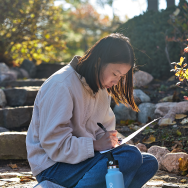University of Chicago writer Rachel Cohen has received the Berlin Prize from the American Academy in Berlin. The Prize is awarded to scholars, writers, composers and artists from the U.S. who represent the highest standards of excellence in their fields.
Cohen will join the 2025-26 class of fellows for a semester at the American Academy in Berlin, where recipients are given time and resources to advance their scholarly or artistic projects.
The cultural critic plans to spend the fellowship writing Time in Pieces: Artists at Work, a book of linked essays about how artists of different eras have represented time.
“I was thrilled,” Cohen said upon receiving the news. “It's just amazing to have this supported time and access to all these collections in Germany.”
About 15 years ago, Cohen began to feel like her sense of time was changing. Others expressed similar feelings to her, citing the climate crisis, pervasive technology or political upheaval as possible reasons.
“I was researching different eras of visual art, and I was noticing that time is always something that feels different in every era,” said Cohen, a professor of Practice in the Arts in UChicago’s Creative Writing Program.
To illuminate her sense of fractured time, Cohen began a series of essays that wove together visual artists working in different eras. Moving from Edo period Japan to Impressionism in Paris and Surrealism as it stretched to Mexico City, Cohen studies how each artist considers their own era’s time and technology. Cohen previously received a Guggenheim Fellowship for the project.
In Germany, Cohen plans to spend time in museums and archives, particularly the Paula Modersohn-Becker Museum in Bremen to research the German artist who is its namesake, as well as to see the Jenny Holzer tribute light and billboard work ‘Mother and Child’ permanently installed there. Cohen also hopes to research artists with ties to Berlin, including UChicago ceramic artists Ruth Duckworth and Theaster Gates, and to interview living artists about their practice.
“This has changed the whole view of what this project can be,” Cohen said.

